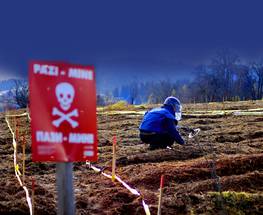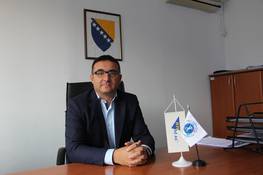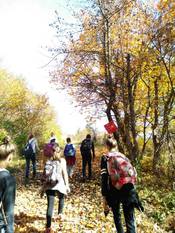|
15.10.2018
Download the press releaseFind photos of the meeting and visit to Sarajevo hereSarajevo-Geneva – Bosnia-Herzegovina as State Party to the Anti-Personnel Mine Ban Convention (also known as Ottawa Convention), is undertaking a national exercise with relevant stakeholders after determining that it will not be able to meet its 1 March 2019 mine clearance deadline. With financial support of the European Union and technical support of the Convention’s Implementation Support Unit, BiH will hold a National Stakeholder Dialogue in Sarajevo, 18-19 October with the participation of over 60 national and international partners.
The national stakeholder dialogue entitled Humanitarian Demining in Bosnia-Herzegovina: Towards Completion will see national mine action authorities, donor governments, demining operators and mine action experts, international and non-governmental organisations, representatives of mine-affected communities, and landmine survivors gathered for two-days of discussions aimed at providing feedback to BiH on strategy and plans to meet mine clearance commitments under the Convention as soon as possible. In the packed agenda, BiH authorities will present the latest information regarding their remaining contamination and what it considers it will need to meet its mine-free ambition. “It is important for those of us in charge of overseeing this issue at a national level, to show that while we have requested additional time for survey and clearance efforts, we are fully engaged and committed towards improving the efficiency and effectiveness of our efforts,” said Sasa Obradovic, Acting Director of the Bosnia and Herzegovina Mine Action Centre (BHMAC).
“This meeting is also an opportunity for us to unveil our 2018-2025 Mine Action Strategy, which will serve to guide our efforts in mine action including mine-risk education and clearance, and assistance to landmine survivors. At the meeting our partners in the international community will learn how they can contribute towards BiH achieving what we set out to do nearly two decades ago, so that new generations don’t have to live under the constant threat of anti-personnel mines,” added the BHMAC Director. This large gathering is possible thanks to funds provided by the European Union Council which adopted a Decision to support mine-contaminated States that are party to the Convention, to address commitments undertaken under the treaty. Since 1996, the European Union has provided more than 46 million euros for demining programs in Bosnia and Herzegovina alone. “The EU's commitment to the demining programs in BiH is clear. Since 1996, the European Union has provided more than 46 million euro for BiH and will invest an additional 10 million euro next year,” said Head of the EU Delegation and EU Special Representative in BiH Ambassador Lars-Gunnar Wigemark. “We are committed to see a BiH free of the threat of these weapons; they are a threat to the security and safety of its citizens. If we wish to properly handle this task, everybody must play their role. The national authorities now have to show a large degree of commitment to meet their national and international obligations. Hosting an inclusive and participatory national dialogue is a step in the right direction,” added Wigemark. Background: A decision taken by the Convention’s body of States Parties extended Bosnia-Herzegovina’s original 2009 mine clearance deadline until 1 March 2019. In April 2018 BiH authorities however, submitted a second request to extend that deadline until 1 March 2021. BiH has cited a number of reasons as the basis for the request: less resources allocated for mine clearance than first envisioned, a still sizable contamination, non‐functional minefield records available, and unforeseen weather conditions. The additional two years will allow Bosnia and Herzegovina to carry out the necessary survey to better define its remaining contamination and return to the table with a final request based on more precise information. A decision on the request will be taken at a Convention meeting in Geneva at the end of November.
For more information contact: isu(at)apminebanconvention.org |




